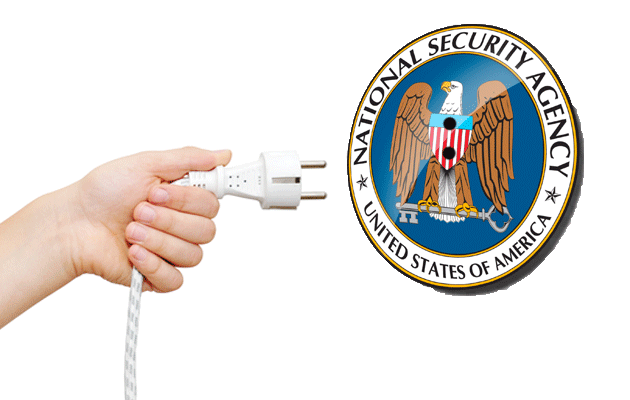
<a href="http://www.shutterstock.com/s/pulling+the+plug/search.html?page=1&thumb_size=large">Jaros</a>/Shutterstock and <a href="http://sayitaintsoalready.com/2013/06/06/folks-we-have-bipartisanship-in-washington/nsa-logo-6-6-13/">SayItAintSoAlready.com</a>
Frustrated with the limited scope of the reforms to the National Security Agency detailed by President Obama on Friday, and the slow pace of Congress in addressing the issue, civil liberties advocates are increasingly taking the privacy fight to state capitols. This month, lawmakers in six states introduced versions of model legislation designed to deny the NSA state resources or cooperation from state officials. The bills cover everything from banning evidence collected by the NSA from being introduced in state courts to shutting off the supply of water and electricity to the agency’s in-state data centers.
“If the feds aren’t going to address the issue, then it’s up to the states to do it,” says David Taylor, a GOP member of the Washington state House of Representatives whose Yakima Valley district hosts an NSA listening post. Taylor’s bipartisan bill, introduced last week, would cut off “material support, participation or assistance” from the state and its contractors to any federal agency that collects data or metadata on people without a warrant. Practically speaking, it would mean severing ties between the NSA and state law enforcement, blocking state universities from serving as NSA research facilities and recruiting grounds, and cutting off the water and power to the agency’s Yakima facility.
Similar bills, some of them less broad, have been floated in California, Oklahoma, Indiana, Missouri and Kansas. Others are expected in coming months in Michigan, Arizona, and Utah. Unlike the symbolic resolutions that oppose the NSA’s warrantless spying, which have passed the Pennsylvania House and the California Senate, few, if any, of the more consequential anti-NSA bills are likely to become law. But their existence underscores the depth of grassroots opposition to the agency’s dragnet surveillance programs, and the willingness of lawmakers from both parties to take a stand.
“I think there is a value in the message that it sends to DC, which is, ‘We’re not gonna put up with it,'” says Hanni Fakhoury, a staff attorney for the Electronic Frontier Foundation. “It encourages lawmakers in DC to actually do something about the problem.”
Most of the bills are based on model legislation crafted by OffNow, an ideologically diverse coalition organized by the Tenth Amendment Center—which has also fought to repeal Obamacare and federal marijuana laws—and the Bill of Rights Defense Committee, a civil liberties group advised by well known anti-establishment figures such as Daniel Ellsburg and Naomi Wolf. Activists belonging to Anonymous and Occupy groups have also lent support to the effort under the Twitter hashtag #NullifyNSA. The idea, says Tenth Amendment Center executive director Michael Boldin, was to “get a bunch of people who would probably grab at each others’ throats on most issues and say, ‘Let’s get something done.'”
The idea of severing state ties with certain federal agencies isn’t as far-fetched as it may seem. Last year, California Governor Jerry Brown signed a law that shields illegal immigrants arrested on suspicion of various crimes from being turned over to federal immigration authorities, and another law barring state cooperation with any effort by the feds to detain people indefinitely under the National Defense Authorization Act. Washington State and Colorado, of course, don’t cooperate with the Drug Enforcement Administration’s efforts to arrest and prosecute growers and users of recreational marijuana.
“This is similar in concept,” says California Senator Ted Lieu, a Democrat from Western Los Angeles County, who introduced an anti-NSA bill earlier this month. “We’re not telling state officials to violate the law; we’re just telling them to not support the NSA in violating our rights.”
The OffNow organizers are particularly eager to introduce a version of their bill in Utah, where the NSA is building a new $1.5 billion, 100,000-square-foot data center in the desert near the town of Bluffdale. To cool its massive computer servers, the center will require some 1.7 million gallons of water daily. The campaign is urging people to ask Utah legislators to turn off the tap:
The Tenth Amendment Center’s Boldin acknowledges that it probably won’t happen; the data center is a popular in Utah for the boost that it will provide to the local economy. But he holds out hope that one or two of the other state measures might pass. “Each small step builds to something greater,” he says. “At least, that is the goal.”

















